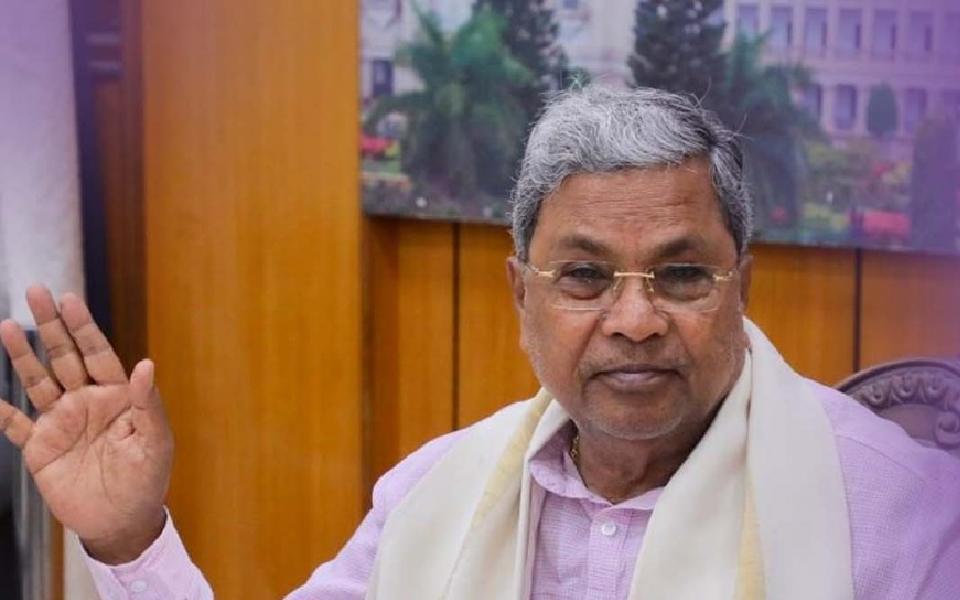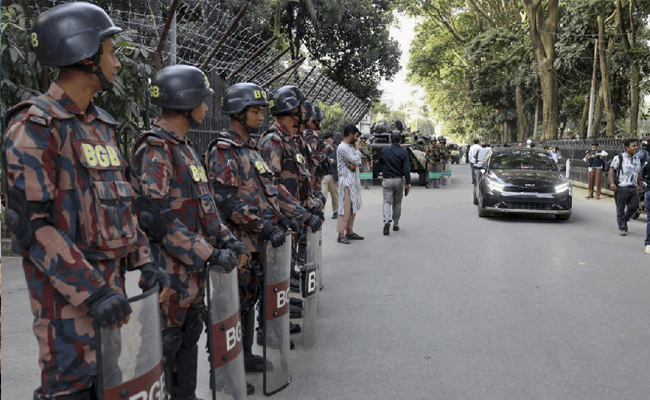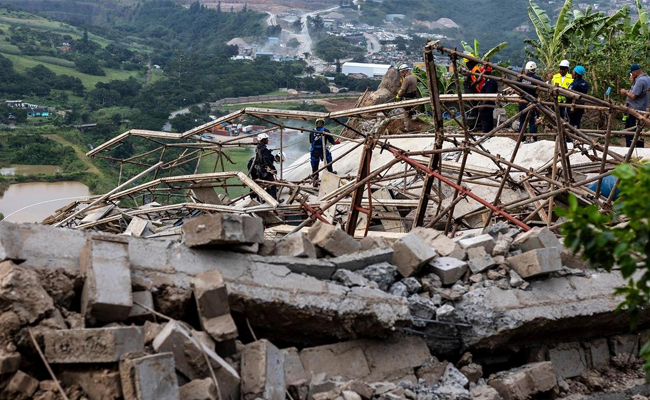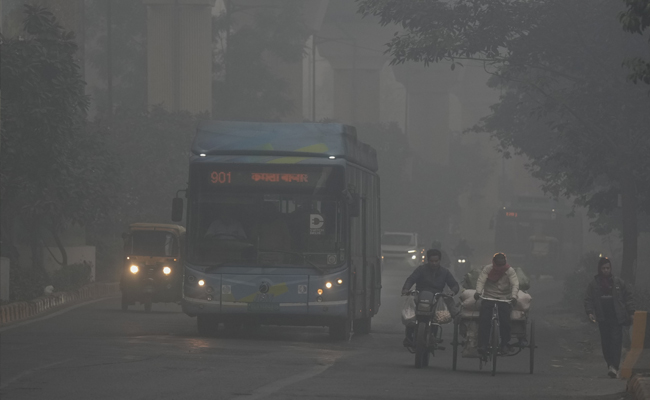Bengaluru (PTI): Karnataka Chief Minister Siddaramaiah has written to the union government to review the current parameters for a state to declare drought and consider amending it, to establish a more responsive framework that acknowledges the realities of each state and offers timely assistance to the farmers in particular.
In the backdrop of deficient Southwest Monsoon rains received in Karnataka, the chief minister has written Union Agriculture Minister Narendra Singh Tomar, concerning the "stringent" parameters prescribed in the 'Manual for Drought Management-2016', as updated in 2020 for the declaration of drought by state governments.
"In the current Southwest Monsoon season, Karnataka has recorded 234 mm as against a normal rainfall of 336 mm, with 34 per cent deficiency. This was also in the backdrop of delayed arrival of the monsoon and a deficit of 56 per cent in June due to weak monsoon," Siddaramaiah said, adding that throughout this season, the rainfall distribution and intensity has been erratic.
"Despite drought-like conditions in several taluks, we have not been able to meet the existing parameters for declaring drought, which is leaving our farmers without critical support such as input subsidy required in the event of failure to commence sowing operations /mid-season crop failure after sowing due to weak rains apart from other drought management/mitigation measures as set out in the manual," he said.
"While it is understandable that the norms for drought declaration are established to ensure accurate assessments and appropriate allocation of resources, it is essential to recognise that each state and the regions within the state have their unique challenges and requirements," Siddaramaiah said.
He said it is crucial to re-evaluate the current parameters for drought declaration to accurately respond to the "dire situation" arising due to erratic weather conditions propelled by climate change and its adverse impact on farmers and the agricultural sector.
"The current situation demands a more flexible approach to the existing norms, taking into account the long-term implications of prolonged water scarcity on agriculture and the livelihoods of farmers," he said.
Noting that the last few years have witnessed unprecedented challenges and adverse weather conditions -- mainly driven by climate change -- affecting various aspects of life, he said the increasing frequency and intensity of droughts have had severe consequences, including crop failures, water scarcity, and socio-economic hardships for rural communities.
Further highlighting that while the existing drought declaration parameters as set out in the revised drought manual have served as important guidelines for assessing and responding to drought situations, the CM said, they may need to be revised to reflect the diverse 14 agro-climatic zones in the State, each facing distinct challenges.
The current one-size fits-all approach to drought declaration is not capturing the nuances and variations in different regions, he said. It is important to develop region-specific criteria that consider local ecological factors, water availability, and agricultural practices, he added.
A few key considerations that the CM has as suggested in his letter include: Rainfall Deviation index ranging from -20% to -59% may be considered as mandatory trigger for drought declaration, and lower than two weeks consecutive dry spell should be considered under rainfall related indices instead of 3-4 weeks.
He also said that the early declaration of drought has been made difficult due to the condition imposed in the manual that sowing has to be completed and a declaration has to been given by state governments stating that "no further sowing is expected" in regions affected by drought. This is contrary to the input subsidy concept of immediate relief and restart of economic activity, and prevents the state government from undertaking immediate relief and mitigation, he added.
Let the Truth be known. If you read VB and like VB, please be a VB Supporter and Help us deliver the Truth to one and all.
Dhaka (PTI): The Election Commission (EC) has demanded extra security for its chief, other commissioners and officials as fresh unrest visibly gripped Bangladesh after gunmen shot an upcoming parliamentary polls candidate and frontline leader of last year's violent street movement dubbed 'July Uprising'.
"The EC has written to the Inspector General of Police (IGP) urging comprehensive security arrangements for the Chief Election Commissioner (CEC), Election Commissioners (ECs), senior officials of the Election Commission Secretariat," the state-run BSS news agency reported on late Saturday.
The EC simultaneously sought the extra security for its field-level offices ahead of the 13th national election, as two of them came under attack in southeastern Lakshmipur and southwestern Pirojpur by unidentified miscreants after the announcement of the schedule for the upcoming polls on Thursday.
The commission demanded an additional escort vehicle for the CEC, while one such police escort with a vehicle was currently in place for him. It asked for round-the-clock police escorts for the four commissioners and the senior secretary.
The letter said the enhanced security measures were "urgent and necessary," while EC officials said their 10 regional offices, 64 district election offices and 522 sub-district level offices would store important documents and election materials.
The EC on Thursday said the upcoming parliamentary election would be held on February 12 next year, while a day later, Sharif Osman Hadi was shot from a close range in the head, critically wounding him, as he initiated his election campaign from a constituency in the capital.
Critically ill former prime minister Khaleda Zia's Bangladesh Nationalist Party (BNP) simultaneously asked Muhammad Yunus' government to provide security for all candidates in the upcoming election after the attack on Hadi, who leads a radical right-wing cultural group called Inquiab Mancha.
"We demand that the real culprit be identified immediately and brought under the law, and we call upon this government to ensure the security of all candidates without delay," BNP Secretary General Mirza Fakhrul Islam Alamgir said.
Hadi was also a frontline leader of last year's student-led violent uprising that toppled then-prime minister Sheikh Hasina’s Awami League government on August 5, 2024.
His Inquilab Mancha was also at the forefront of a campaign to disband the Awami League, which the interim government complied with in May this year, disqualifying the party from contesting the polls.
The government on Saturday ordered a nationwide security clampdown called 'Operation Devil Hunt 2' amid escalated fears over the law and order situation and promised to issue firearms licenses for election candidates for their own security.
Home adviser (retd) Lieutenant General Jahangir Alam Chowdhury said the government had taken steps to ensure special security for the "frontline fighters" of the July Uprising and promised to issue firearms licenses for the election candidates.
He emphasised that the second phase of the 'Devil Hunt' was aimed at helping ensure public safety and combat the growing threat of illegal arms.
The operation was initially launched in February this year following protests over an attack on the private house of a former minister of the ousted government in the northern suburb of the capital, when it targeted alleged "henchmen" and supporters of the now disbanded Awami League.





